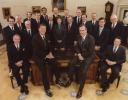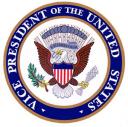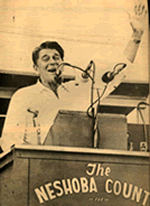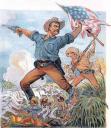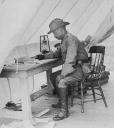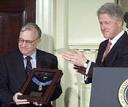Ronald Reagan: Fighting Racism
21-Nov-07
The Krugman/Brooks/Herbert New York Times round-robin on the Neshoba Country Fair, 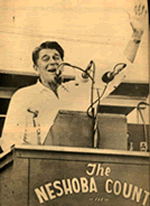 Ronald Reagan, and racism has reached all portions of the universe, with some truly peculiar arguments now being advanced in Reagan’s defense.
Ronald Reagan, and racism has reached all portions of the universe, with some truly peculiar arguments now being advanced in Reagan’s defense.
At National Review Online Deroy Murdock defends going to Neshoba, writing that
“Though some staffers worried about this appearance, Reagan believed in honoring his scheduled commitments, not canceling them.”
Sticking to his appearance commitments would go on to serve Reagan well at 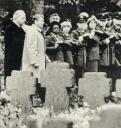 Bitburg, and gosh, whatever did those staffers think might happen?
Bitburg, and gosh, whatever did those staffers think might happen?
Murdoch’s examples of Reagan’s anti racism range from the odd:
“Ronald Reagan Jr. recalls the day at a California barbecue when his father dived into a pool to save a black child from drowning.”
…to making the case against Reagan. Murdoch excuses Reagan’s opposition to a Martin Luther King federal holiday as thrift, but then wanders into Reagan’s snide response when asked about Jesse Helms’ red-baiting of King.
‘ “We’ll know in about 35 years, won’t we?†Reagan telephoned Mrs. King to apologize for that comment.”
But it got all better when he invited Mrs. King to the White House! 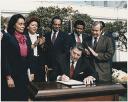
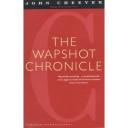 Murdock links to an even more strained defense of Reagan by Nicholas Wapshott, author of Ronald Reagan and Margaret Thatcher: A Political Marriage.
Murdock links to an even more strained defense of Reagan by Nicholas Wapshott, author of Ronald Reagan and Margaret Thatcher: A Political Marriage.
Wapshott brings up examples of Reagan’s alleged antiracism which reveal more about Wapshott than Reagan.
Did you know that “The Reagans were so poor that he played in the street with black children and thought little of it.“?
By fourth grade however, Reagan’s elementary school class appeared to be Negro-free. 
Wapshott hurts Reagan without knowing it, dragging poor old Housing and Urban Development Secretary Samuel Pierce around one more time:
So not close, of course, that when Pierce and some mayors were at the White House Reagan didn’t recognise Pearce. “Mister Mayor,” Reagan said, “how are things going in your city?””
David Greenberg in Slate sums up the case for the prosecution:
“No one who used the phrase “states’ rights” in living memory of the massive resistance movement against forced desegregation could be unaware of the message of solidarity it sent to Southern whites about civil rights… But because the term also connoted a general opposition to the growth of the federal government’s role in economic life, nonracist whites could comfort themselves that politicians like Nixon and Reagan were using it innocently—and thus shrug off any guilt they might feel for being complicit in racist campaigning. It was a dog whistle to segregationists…Reagan succeeded in altering the terms of political debate when it came to race. Stripping away the crude bigotry that had cost the white South the rest of nation’s sympathy in the 1950s and 1960s, he and other conservative political leaders fashioned an ideology in which racial politics were implicit, and yet still powerful. Ever since, their followers have been able to indignantly claim that any allegations of racism are smears and slurs—and discredit the entire discussion by making it about personal prejudice rather than public policy.”

